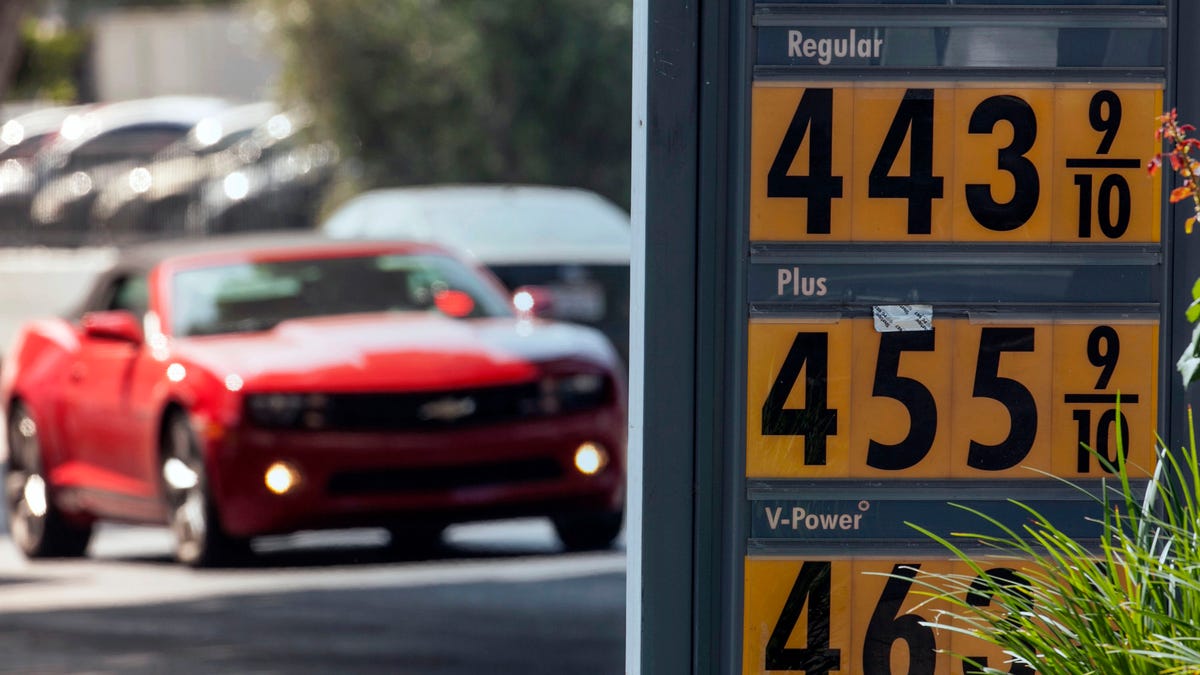
Oct. 4, 2012: Motorists drive past a gas station in Los Angeles. Motorists in California paid an average of $4.232 per gallon Wednesday. That is 45 cents higher than the national average and exceeded only by Hawaii among the 50 states. (AP)
SAN FRANCISCO – The recent spike in gasoline prices around the nation is expected to wane slowly in coming weeks, but California may not be so lucky due to supply challenges fueled by refinery issues and pipeline outages, analysts said.
Throughout the state, the average price of a gallon of regular gasoline jumped 8 cents Thursday to $4.32 and was up 18 cents during the past week, according to AAA's Daily Fuel Gauge.
Analysts said the average price of regular gas was poised to quickly soar past $4.37 a gallon -- the high so far this year -- after refinery outages and pipeline problems left California short on supplies.
The highest average price ever for regular gasoline in the state was $4.61 in 2008.
Among the recent disruptions, an Aug. 6 fire at a Chevron Corp. refinery in Richmond left one of the region's largest refineries producing at a reduced capacity. A power failure in Southern California has affected an Exxon Mobil Corp. refinery, and a Chevron pipeline that moves crude to Northern California also was shut down.
Elsewhere, the national average for gas is $3.78 a gallon, the highest ever for this time of year. However, gas prices in many states have started decreasing, which is typical for October.
But in California, gasoline inventories are the lowest in more than 10 years -- a situation made worse by the state's strict pollution limits that require a special blend of cleaner-burning gasoline.
Patrick DeHaan, senior petroleum analyst at GasBuddy.com, said he is seeing the highest prices in the state around Los Angeles, where at least five stations have crossed the $5 a gallon mark, including $5.29 in Burbank and $5.11 in Norwalk.
Prices will keep rising, he says, because in the past week wholesale gasoline prices have jumped $1 a gallon, but average retail prices have increased only 30 cents.
"This is one of the easiest forecasts: Retail prices are going to skyrocket," DeHaan said.
The jump in wholesale prices can be particularly tough on independent gas stations that often pay more for their gas because they are not part of a larger chain.
Tom Kloza, chief oil analyst at Oil Price Information Service, said he's heard of a few California station owners shutting their pumps rather than charging the $4.90 a gallon or more necessary to break even.
"Wholesale price increases lead to retail price increases," Kloza said. "But there is some restraint among companies who do not want to exercise their current pricing power and irritate their customers."
Some analysts believe prices nationally will begin to decline soon but say California could see a longer spike given its unique fuel requirements.
"Nationally, I believe most prices will wobble to and fro for the next week or so, with an eventual slow but steady attrition in retail gas prices, particularly in the Midwest and Southeast," Kloza said. "California is a wild card."





















